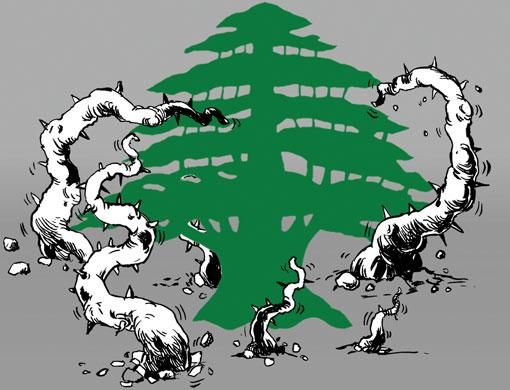Few outsiders can fathom Lebanese political rivalries that strive to perpetuate ossified fiefdoms. On Monday, leading zu'ama (leaders) adjourned negotiations on a national defence strategy until early March, because little progress was made on the thorny issue concerning Hezbollah's weapons. With about a month to go before the international tribunal convenes in The Hague to try suspects in the 2005 murder of Prime Minister Rafik Hariri, and with the threat of fresh assassinations looming over the horizon, is Beirut on the brink of new confrontations?
After four stale rounds, leaders participating in the so-called national dialogue have failed to reach a consensus on routine procedural matters, which prompted the President Michel Sulaiman to seek the appointment of a committee of experts to examine several proposals.
While the critical defence strategy question was placed in abeyance, a timid statement was issued to finally proceed with the implementation of previous agreements, even if none were executed during the past seven months.
Miraculously, a consensus emerged on how best to address the growing lawlessness around Palestinian camps, even if this issue was nothing more than a smokescreen. Yet, by agreeing on a concern over which disagreements waned some time ago, officials telegraphed serious divisions on the tribunal matter as well as deep political cleavages ahead of the June 7 parliamentary elections.
Surprisingly, President Bashar Al Assad of Syria confirmed on Al Manar Television his preoccupations with the tribunal, but revealed that some kind of a deal might be in the offing to try his suspected countrymen under Syrian Law. Needless to say that while Damascus might secure an escape clause should such an arrangement be ironed out, its Lebanese foes will not be satisfied, insisting on a fuller judicial course.
No one should be under any illusion that these two positions are beyond redemption. Moreover, few should doubt intrinsic abilities to tie the tribunal's fate with both the national dialogue or what passes for one, as well as the epochal parliamentary elections that will permanently change the country's future. Indeed, the main parliamentary groups are not only confronted by a stumbling block over Lebanon's common defence strategy, but they also disagree on just about everything else.
Under the circumstances, how can Beirut break away from its current doldrums, and literally distance itself from its minority blocking privilege, when what's at stake is Lebanon's very identity as a country as well as its inhabitants' desires for a multi-confessional and multi-cultural society? Make no mistake about it, the country's core values, both at the institutional level as well as its outlook for a genuine melting pot, are now on the line.
Electors who will cast ballots will not simply choose representatives but select the kind of tolerant environment that the country has been struggling to keep alive during the past few decades.
In reality, what many Lebanese already know is that institutions are vital, whereas politicians are dispensable. It is parliament that is critical not the Speaker, the prime ministership, not the Prime Minister, and the presidency itself, not the President.
The challenge for this group of Lebanese, that is those who believe in their country's institutional prerogatives, is to persuade the rest to emulate them. An even greater test is to separate the traditional zu'ama who serve themselves from those few elected representatives who painstakingly serve their constituents.
Admittedly, the latter is an art form that must be practised regularly and with zeal even as regional forces drag specific communities into their own orbits, which result in unlimited turf wars.
Lebanon's two neighbours, Syria and Israel, have conflicting outlooks but both are in search of specific goals. Damascus insists on retaining Beirut within its own sphere of influence whereas Israel has its eyes on Lebanon's waters. It behooves Lebanese electors to appreciate what their neighbors want from them - or plan to eventually acquire by force - and help build a strong institution-laden society that thrives on protecting the country from predators without betraying their unique identity.
Moreover, whereas the current parliamentary majority claims that Hezbollah's weapons undermine the state's authority, the Party of God insists that it is not serving regional interests, but that it cannot possibly disarm while the Israeli threat persists. While both of these arguments contain some truths, the majority must come to terms with specific demands made by Hezbollah and its Shiite supporters, while the latter must understand that their strategic depths are Lebanon's Christian and Sunni communities - and no one else.
In the end, everyone must accept demographic changes without challenging the country's political make-up, nor believe that such transformations allow for an extreme makeover. Doing so will result in a permanent division and such a deleterious outcome will end the only Arab democracy while severely limiting the geographical space where freedom thrives. It is up to all Lebanese to understand that unity is the only remedy to deny regional foes long-cherished aspirations.
The Lebanese share much except for a joint vision to preserve their way of life. That's what is missing in the national dialogue. That's what the international tribunal will assert. That's what upcoming parliamentary elections will determine.
Dr Joseph A. Kechichian is a commentator and author of several books on Gulf affairs.













